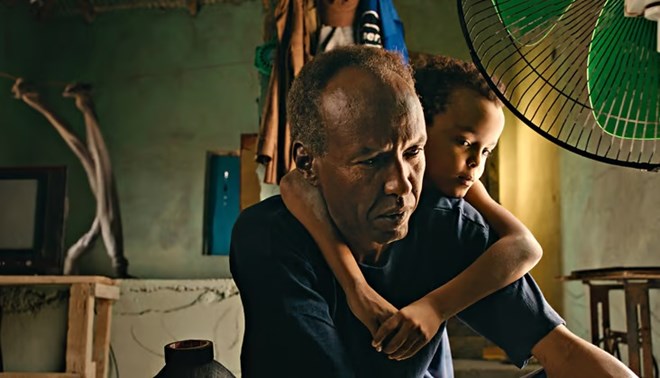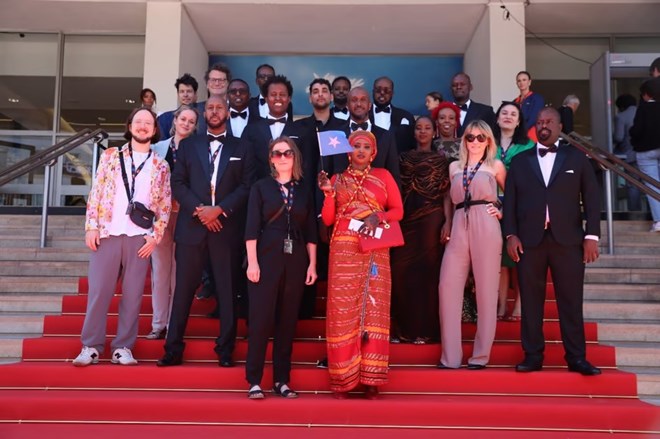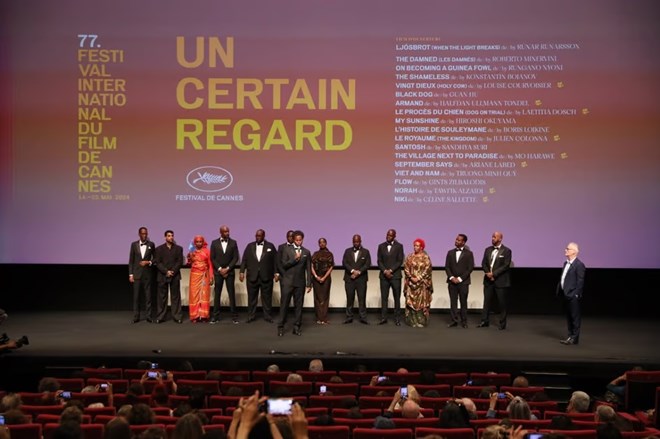
Friday May 31, 2024
By Adham Youssef

Still from the film, ‘The Village Next to Paradise’. (Photo: Supplied)
Somali director Mo Harawe delivers a sensitive ode to family and resilience in his long feature debut ‘The Village Next to Paradise’ (2024) which saw its world premiere at the Un Certain Regard competition in the Cannes Film Festival, making history as the first Somali film to be screened at the prestigious event.
Like many African cultures, storytelling is a crucial part of Somalia’s oral history. Back in the 1960s, Somali artists and filmmakers started to make their films. Harawe puts his feature next to a wave of filmmakers trying to create a name for Somali cinema in international film festivals.
Using militancy and counter-terrorism as context
The Village Next to Paradise (2024) follows an ordinary story of a family with various personal challenges while trying to better their lives and look forward after going through several unfortunate experiences, drawing a portrait of the country.
The film, revered at the Cannes, starts with a news segment from English TV reporting the death of a senior member of the Al-Shabaab terrorist group in a US drone strike. However, the film does not concentrate on militancy and counter-terrorism. For Harawe, the terror threat merely provides the context and is not central to the story. He uses it as a device to give viewers a thread to understand the story’s setting and the Somali people’s environment.

Cast and crew of ‘The Village next to Paradise’ (photo supplied)
After this scene, he introduces one of the main characters, Mamargade (played by Ahmed Ali Farah), who works as a driver, mechanic and occasional gravedigger. In the early scenes, he digs a grave for the man who was killed in a drone strike.
Mamargade arrives home where he meets his son Cigaal (Ahmed Mohamud Saleban) who just had a lesson at school to learn how to duck and hide if there is a drone strike. Mamargade’s sister Araweelo (Anab Ahmed Ibrahim) also lives in the house. She is more at ease at home after Mamargade ended his marriage in court, thereby removing her sister-in-law from the homestead.
Mamargade and Araweelo follow similar paths, but with different approaches. One is haphazard and seeking quick high-paying gigs over steady work, while the other saves and plans to open a tailor shop.
Through day-to-day interactions, Harawe presents a family who leads a relatively ordinary life until faced with a major obstacle when one of Mamargade’s driving jobs puts him in trouble when wrongfully arrested over suspicion of aiding terrorists.
Telling both sides of the story
“I am showing the resilience of the people and the freedom that they have because they are not giving up,” he tells The Africa Report. “I didn’t want to depict them as victims. I was very conscious about that because I feel the same. I can relate to the attitude that comes from the freedom of being a Somali person,” he adds.
“I am aware of what is being produced about Somalia [which is focussed on terrorist acts]. But I was conscious of really showing the other side of the coin; the side that you don’t know about the country,” Harawe says. “ I think it is the responsibility of the person taking that frame to choose which side to tell and not to tell, and if you want to tell both. For me, I am trying to tell both sides.”

Accepting the Un Certain Regard award at Cannes May 2024 (photo supplied)
A vehicle to show a better Somalia
In the film’s background, there is mention of more drone strikes, landmines, contaminating sea water, naval piracy and illegal fishing, all of which are problems that affect the characters, but they remain positive. Harawe acknowledges that his country and society have problems, although many are external.
We don’t have the usual top-bottom state system
“This is why I chose the title The Village Next to Paradise,” adding that Somalia has the potential to become a better place if these external problems are addressed.
“We don’t have the usual top-bottom state system, like the one that functions all over the world. We don’t understand it. We have our own system, customs and rules,” says Harawe.
“Because there is no system, Somalis are not dependent, which is why I see a freedom in that,” he explains. “I don’t think there is another country in the world that can survive like that. So, if today, doomsday comes, only Somalia will survive.”